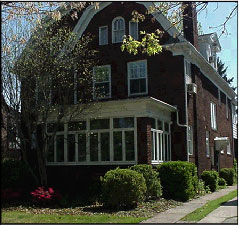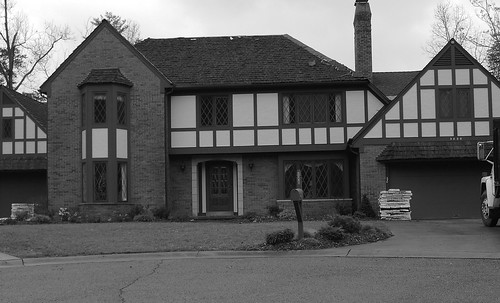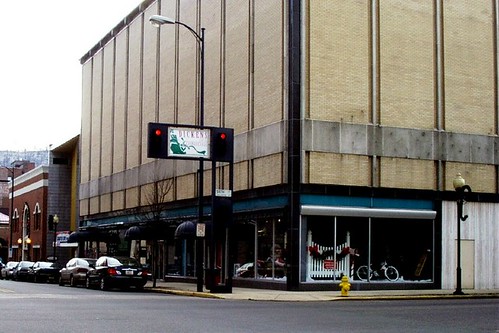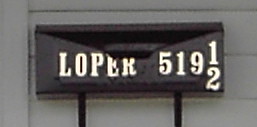
519 Third Street
In recent blogs, in “Grossly Misrepresented” and “Miserable Failures,” I made the case that, at this particular time, for those of us who live in the First Ward, in the city of Portsmouth, in the state of Ohio, in the United States of America, things could not be worse politically, considering who we have representing us as president, governor, congresswoman, mayor, and councilman. I want to say more, now, about Timothy Loper, the councilman in question. I will elaborate on what I had written about him in an earlier blog, “Lord, Help Us!” Rumors that Loper has recently undergone a religious conversion only adds to the eerie symmetry between the highest and the lowest, between the White House and the First Ward. All I can say is that when incompetence, criminality, and Pentecostalism combine, “Lord, help us!”
I first heard the name Timothy Loper in 2004, when he announced he would run as the reform candidate to replace councilwoman Ann Sydnor, who had angered voters in the First Ward by supporting the controversial purchase of the Marting building. At the time, I was making a documentary on the recall movment, and I arranged to interview Loper. Up until that time, I knew very little about Portsmouth’s politics, but in the process of making the Recall of Mayor Bauer I learned that the politicians and the over-privileged of the city were, as Roy Rodgers, Portsmouth’s adopted native son, might have put it, “as crooked as rattlesnakes.”
When I told an acquaintance whose opinion I respect that I was going to interview Loper, I was warned he was “worthless,” unable or unwilling to hold a job, and like other Lopers, prone to lawbreaking and violence. I knew that Carl Loper, a member of the Portsmouth Police Dept., had slain his estranged wife with a shotgun. I knew that Carl’s son, Zane Loper, a part-time policeman, had been convicted of sexually molesting retarded children at the Mental Retardation and Developmental Disabilities (MRDD) center, and that he was serving a long prison term. Timothy Loper was not in their league, of course, but my acquaintance warned me that I and anyone else in the reform movement who helped him get elected would live to regret it.
In spite of these warnings, I interviewed Loper on the porch of his home on Madison Avenue on a humid afternoon. His wife came to the door once during the interview and one of them asked the other if the dog had been fed. They spoke like caring dog owners and like loving parents, which I'm sure they are. Loper told me of his difficulty in finding work in the Portsmouth area. He expressed frustration at those who controlled the city, those in the Southern Ohio Growth Partnership (SOGP), for failing to bring in new industries and jobs to the area. He expressed strong disapproval of the purchase of the Marting building by the Portsmouth City Council. “I’m in there writing a letter-to-the editor,” he told me. “It don’t make sense,” he said, “paying two million for a building they could’ve got for half that.” Listening to him, it was easy to believe he was a concerned citizen, a sincere reformer, the genuine article. So even though he had no experience in public life; even though he was a high school dropout; and even though I had been warned against him, I voted for him.
Only later did I learn that Loper himself had not been part of the recall movement. I recently talked to someone who had collected signatures in the First Ward for the recall of Sydnor. "How many signatures had Loper collected, I asked? I was told, "One!" While he did none of the work that made the recall vote on Sydnor possible, Loper offered himself as a recall candidate, much like someone who watches others plant and nurture a crop and then volunteers when it is ripe to harvest it, for himself.
It was a very close race, but Loper was finally declared the winner. But not long after he took his seat on the city council, he changed his tune and supported the Marting’s scam and voted with those other council members who are in the pocket of the SOGP, which controls Portsmouth economically and politically. He had cashed in on the reform movement and then sold it out. In August 2005, Loper told Julie Stout that after he was first elected to the council he was brought to meet Clayton Johnson, the capo of the SOGP. Like the dog in the old RCA advertisement, Loper learned to recognize his master’s voice. He was not going to bite the hand that might feed him.
If I had checked out Loper’s rap sheet on the Portsmouth Municipal Court website, as Lee Scott was urging people in the recall movement to do, I might not have been so surprised at what a lowlife Loper showed himself to be. Among other things, his rap sheet reveals that he has a drinking-and-driving problem. He has been arrested for driving under the influence, driving with a suspended license, driving with expired tags, and driving well over the speed limit. In May 1998, his traffic problems resulted in a thirty-day sentence in the county jail, which was suspended, but he was put on probation for a year.
If driving and drinking are a problem for Loper, so is handling money. In March 1995, he and his wife were taken into court and ordered to pay a West Virginia finance company $3,653, plus interest. In July 1997, there was another judgment against him for $1,766. In March 1999, he was taken to court for a $1,662 debt, which was garnished from his salary at Mills Pride from Sept. of 1999 to Feb. of 2001. For his failure to pay taxes, in February 2005, the Ohio Dept. of Taxation put a lien on his Madison St. house. In March 2005, in a court action, the mortgage on their house was foreclosed and the house was ordered sold at a sheriff’s auction, which took place on 17 August 2005. If what Loper told Julie Stout shortly afterwards was true, he not only lost his house but he came close to losing his wife. A separation was at least a possibility.
Those are the financial and personal difficulties Loper was in at the time he decided to run for public office, first as a recall candidate, in 2004, and then for a full term, in November 2005. It seems some people, when they fail at everything else, when they are desperate enough and have no where else to turn, turn to religion and to politics. To revise a famous observation of George Bernard Shaw: Those who can, do; those who can’t do anything else, run for public office, whether it’s for the presidency of the United States or for the Portsmouth City Council. Talk about miserable failures, from the very top to the very bottom, from the White House to the First Ward, we’ve got them.
Councilman Loper
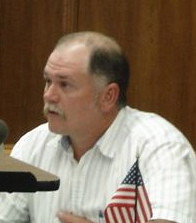 The high school dropout who has trouble handling alcohol, automobiles, and money, found himself as a councilman with something other people finally were willing to pay for: his vote. He had found his calling. Like a surfer who takes somebody else's surfboard, he had ridden the recall wave into office and then had joined with those who want to make recalls even harder than they already are. Recalls are already harder, under the Portsmouth city charter, than they are in those cities that follow the Ohio Revised Code. So Loper and Mayor Kalb agreed that recalls should be curbed. It is like two guys who used somebody else's surfboard to ride into office, then turn around and want to practically outlaw surfboards. I say practically outlaw because the city solicitor would be the one to decide if recalls can get on the ballot. Putting David Kuhn in charge of recalls is like putting Michael Jackson in charge of a kindergarden.
The high school dropout who has trouble handling alcohol, automobiles, and money, found himself as a councilman with something other people finally were willing to pay for: his vote. He had found his calling. Like a surfer who takes somebody else's surfboard, he had ridden the recall wave into office and then had joined with those who want to make recalls even harder than they already are. Recalls are already harder, under the Portsmouth city charter, than they are in those cities that follow the Ohio Revised Code. So Loper and Mayor Kalb agreed that recalls should be curbed. It is like two guys who used somebody else's surfboard to ride into office, then turn around and want to practically outlaw surfboards. I say practically outlaw because the city solicitor would be the one to decide if recalls can get on the ballot. Putting David Kuhn in charge of recalls is like putting Michael Jackson in charge of a kindergarden.
Having been elected to the city council as a reform candidate in the special recall election of 2004, Loper was determined not to let his campaign promises and the city charter stand in his way of being reelected in November 2005. Since he was running unopposed, his chances of reelection looked good. There was one serious problem, however. Loper and his wife had moved out of the First Ward following the auctioning off of their Madison St. house. How could he get around the First Ward residency requirement, stipulated by the city charter, when he was living at 4024 Pleasant St., in the Sixth Ward? He got around it with the help of some friends from West Portsmouth and from city solicitor David Kuhn.
519 1/2 Third St.

There is a house in the First Ward at 519 Third Street. A couple named Flailey had bought the house in Sept. 2002, only to sell it the following year, 2003, to Bart and Mary Journey. In 2004, the house was in the name of a BBC trust. The following year, August 2005, it was in the name of the Journey Family Trust, of West Portsmouth. Several Journeys of West Portsmouth had gained notoriety in the past as a result of an insurance scam that resulted in convictions and prison terms for at least two of them, Mark and Bart Journey, apparently the same Bart Journey who bought 519 Third St. in 2003.
The Scioto County Auditor lists 519 Third St. as a two-family dwelling,with the owners reportedly occupying the bottom floor, with another apartment occupying the second floor. Since auditor’s records show there is only one bathroom in the house, it must have been an unusual arrangement between the occupants on the first and second floors. A note on the auditor’s listing says, referring to the apartment on the second floor, “CHECK IT OUT.” I wonder if anyone ever did.
The Third St. house was built in 1900, as a private residence. At some point a shed in the rear and a narrow annex were added on the eastern side of the building. The auditor’s records suggest and others have told me that a shoe repair shop once occupied the narrow annex. The annex has been referred to more recently as a “storeroom,” and even more recently as the residence, or office, of Third Ward councilman Timothy Loper. There is an attempt to make it look like somebody lives at 519 and at 519 1/2 Third St. The chairs outside the house have been there all winter, but I have never seen anybody sitting in them, winter or summer. There is an orange traffic cone in front of the front door, which might suggest there is a lot of traffic going in and out, but I have never seen any, though I have heard a rumor of drug trafficking.
Whenever it was added, the white vinyl façade on the front lower half of the house, like the façade on the Marting’s building, is meant to hide its age. A photograph of the rear of the shingled house gives a more accurate indication of the decay – the loose shingles, the rotting gutters, the sagging frame. Judging by the exterior and especially interior condition of the house, it is very unlikely anyone lives there now. When anybody last actually lived in the house is not clear.
On 18 Oct. 2005 in a memo to the city council, with a copy to Harald Daub, who had asked for an investigation of Loper’s claim that 519 1/2 Third was his legal residence, City Solicitor David Kuhn wrote that he had viewed the outside and inside of the property. “The property is being remodeled, with new electric, plumbing and drywall work, and the First Ward Councilman is paying for the renovation, even though the property is owned by the Journey family. The First Ward Councilman has telephone service and internet service there, and receives mail there. Until the renovation is completed, the First Ward Councilman is temporarily residing out of the First Ward, but he intends to resume residing at 519 1/2 Third Street after the renovations are completed.” Yes, and you better not question the truthfulness of this malarkey, or you might end up in the hospital, as Harald Daub did after Loper sucker-punched him one evening. Daub tried to file charges, but there were no witnesses. Loper, like the city council, likes to do his dirty work in the dark.
Having asserted that 519 ½ Third is Loper’s bonafide residence, Kuhn concluded the First Ward is where Loper is entitled to vote. “The standards employed by the Board of Elections to determine a person’s voting residence,” Kuhn wrote, “includes the provision that if the voter temporarily leaves the residence at which he is registered to vote, and intends to return, the voter is considered to be validly registered to vote at the address to which they intend to return.” The reason where Loper is legally qualified to vote is an important issue is that he could not continue to sit on the city council if his legal residence was no longer the First Ward.

Rear of 519 Third St.
Kuhn claimed last Oct. that Loper intended to renovate, but the only permit that has been issued for 519 Third St. was for electrical work, in June 2002. That permit expired in June 2003, before Loper made his claim that 519 1/2 was his residence. Loper’s allegation that 519 ½ is his residence and that he intends to renovate it, at his own expense is a ruse, concocted by him and the city solicitor, to enable Loper to continue, in violation of the city charter, to live with his wife in the Sixth Ward while representing the First Ward on the city council, or I should have said while representing the SOGP on the city council.
Loper’s Madison St. house was auctioned off by the sheriff because Loper had failed to keep up with the mortgage and the taxes. How he would be able to come up with the money to renovate part of a house owned by somebody else is just one of the curious matters connected with 519 Third St. Loper has also made the claim that 519 1/2 is his office. An “office” does not qualify as a residence, a name on a mailbox does not establish residency, and over six months with no renovations on the house having been completed, is hardly “temporary.”
In a notarized affidavit, Julie Stout testified “That Timothy Loper told me that his wife had no interest in moving back to the First Ward, and so he would find an apartment within the First Ward to fraudulently claim as his residence while continuing to reside at his current address outside the ward.” Stout also swore that Loper “hinted that money would not be an issue with him acquiring a new residence in the First Ward. I [Stout] asked him how he would get the money to get a new place that was better that the house on Madison that his wife found so unsatisfactory. He told me he knew some people who would set him up with an apartment.” Who are these people he knew who would set him up in an apartment? The ex-convicts from West Portsmouth or the con artists of Portsmouth?
The provision of the ORC that the city solicitor alluded to but, characteristically, did not specify in his 18 Oct. 2005 memo to the city council, was ORC 3503.02 (A). That provision states “That place shall be considered the residence of a person in which the person’s habitation is fixed and to which, whenever the person is absent, the person has the intention of returning.” This rule to allow someone to vote in a ward from which he or she is temporarily absent does not cover Loper’s case. Loper’s fixed place of habitation was 114 Madison St., where he and his wife lived for years. When that home was auctioned off, Loper and his wife lost their fixed place of habitation. They moved to another house in another ward, and only then did Loper begin to look for a place to use as his new address in the First Ward. The attempt by Loper to claim 519 1/2 Third St. as his fixed place of habitation to which he intended to return is an obvious attempt to remain qualified to be councilman from the First Ward. But 519 1/2 Third St. never was his fixed place of habitation, so his declaration of his intention to return to it is a legal and logical absurdity. You can not return to live in a place you have never lived in. Something has been “fixed” here, but it is not the habitation, and the fixer is the city solicitor.
The issue of which ward Loper has the right to vote in is directly related to issue of whether he has the right to remain as councilman from the First Ward. If he does not have the right to vote in the First Ward, he does not have the right to serve as its councilman. If his primary residence is in the Sixth Ward, he is not qualified to remain on the city council. The Portsmouth City Charter (Section 3) states that “Any member of Council elected from a ward shall forfeit his office if he removes from said ward, and then Council shall at once fill the vacancy for the unexpired term.”
Kuhn’s claim that Loper’s living with his wife in the Sixth Ward is only temporary is something that Loper and his wife will have to swear to, because I have filed a formal challenge to the Board of Elections, asking them to investigate and hold a hearing on the matter. I believe the Board of Elections, at a minimum, has a responsibility to question Timothy and Teresa Loper to determine where they and their dog now live, and whether Loper, his wife, and his dog intend to settle permanently in that storage room at 519 1/2 Third St.
Loper should not be allowed to continue to lie about his place of residence, because it makes a mockery of the Portsmouth City Charter, the Ohio Revised Code, and the spirit of honest democratic government. This shameful situation raises the question of whether Portsmouth is a city of laws or a city where the law can be debased in order to keep in office a corrupt councilman who is useful to the rich and the powerful. In what other city would such fraudulent, patently deceitful electoral shenanigans be tolerated?
Think of 519 Third Street as the house where Portsmouth’s culture of prostitution is shamelessly practiced, as a kind of annex to the city council chambers, and when every church and building of notable architectural and historical importance in Portsmouth is torn down to make way for parking lots and shopping malls, let 519 Third St. remain, along with the Marting building, as a monument to the vices of our river city, so that a hundred years from now parents can take their children by it and say, “There, ninos, is the house of ill repute, where a gringo councilman claimed he lived, back in the days when criminals and corrupt politicians and developers controlled this city, and no one believed it could ever be any different.”

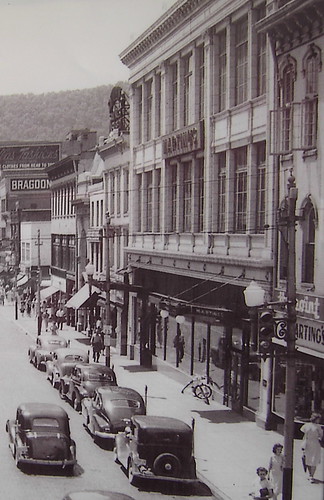
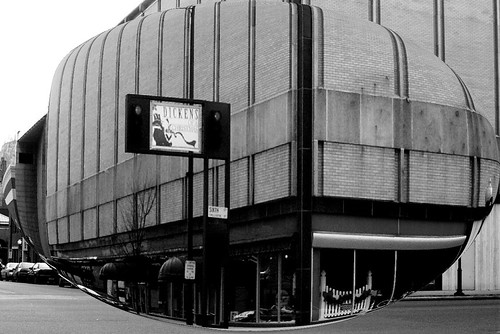
 What does the 1909 façade of the Marting building really look like forty years after the curtain wall was applied? The Hollywood star Rita Hayworth used to say that men went to bed with her and were surprised the next morning to wake up with Margarita Carmen Cansino (her real name.) With the Marting building, the city of Portsmouth may think it’s going to bed with Rita Hayworth, but it will wake up not with Margarita Carmen Cansino but with Phyllis Diller. If this latest renovation goes forward, the Marting building will have had as many facelifts as Diller: four, and counting.
What does the 1909 façade of the Marting building really look like forty years after the curtain wall was applied? The Hollywood star Rita Hayworth used to say that men went to bed with her and were surprised the next morning to wake up with Margarita Carmen Cansino (her real name.) With the Marting building, the city of Portsmouth may think it’s going to bed with Rita Hayworth, but it will wake up not with Margarita Carmen Cansino but with Phyllis Diller. If this latest renovation goes forward, the Marting building will have had as many facelifts as Diller: four, and counting.

